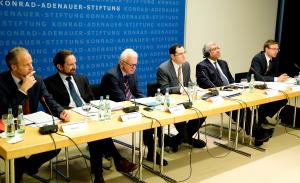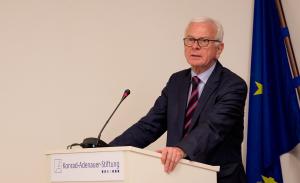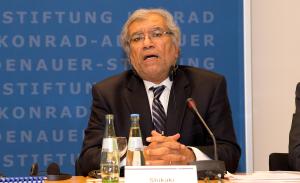Single title
Summary of the key findings of the two surveys
The key findings of the Israeli section of this survey can be summarised as follows:
- Israelis have a very positive attitude towards Germany, with no significant differences between the various age groups. In the popularity rankings, Germany is the undisputed number one among European nations.
- Germany's role in Europe, international politics and the Middle East conflict is viewed extremely positively in Israel and there is a clear desire for Germany to play an even more active role in future. Israeli citizens do not have a negative view of the fact that the German government is involved in both Israeli and Palestinian issues.
- The role of the German Chancellor in German-Israeli relations cannot be emphasised strongly enough. Her popularity in Israel is extraordinarily high. This is particularly due to the support shown by Germany and the German government for Israel's right to exist.
- The differences between Arab and Jewish Israelis are relatively small. This similarity in attitudes points to a high degree of loyalty towards the Israeli state. It sends out a message that should be cause for reflection, particularly among the supporters of the proposed law for a Jewish nation state, which will restrict the rights of Israeli Arabs. Almost universally, Israelis of Russian descent have a more critical view of Germany. It seems likely that this is due to lingering stereotypes from the days of the Cold War. Israelis who are older or more secular take a more positive view of Germany and the Germans. Israeli men are more positive about Germany than women.
- The Palestinians have good contacts with Germany, are interested in Germany and think that Germany is a role model in terms of its economic and political development. This positive image of Germany is particularly strong in Gaza because many people there have personal connections with Germany.
- Palestinians think Germany is a major supporter of Israel but understand the reasons behind this extraordinary and unusual relationship.
- Palestinians see Germany as a supporter of the Palestinian people and their desire for statehood. Yet German-Palestinian relations could still be improved at political level.
- Despite Germany's close friendship with Israel and the need to strengthen bilateral political relations, Palestinians believe Germany is one of their most important European partners and are keen to see more engagement from Germany at international level.
Topics

Cafe Kyiv 2025 Registration
Register today for Cafe Kyiv 2025 and look forward to exciting guests and a varied programme.
Register now






